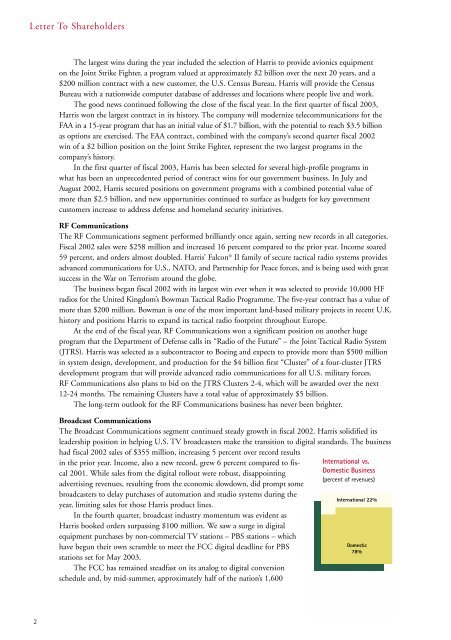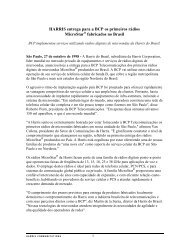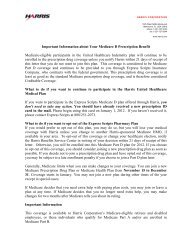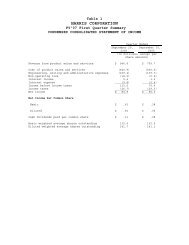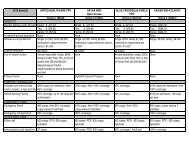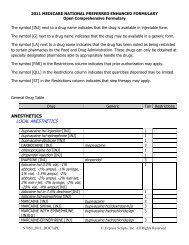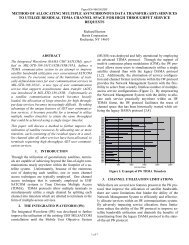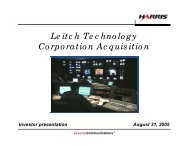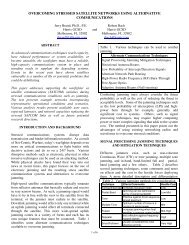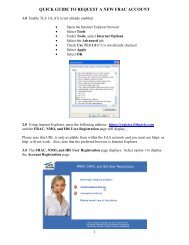Harris 2002 Annual Report
Harris 2002 Annual Report
Harris 2002 Annual Report
You also want an ePaper? Increase the reach of your titles
YUMPU automatically turns print PDFs into web optimized ePapers that Google loves.
Letter To Shareholders<br />
2<br />
The largest wins during the year included the selection of <strong>Harris</strong> to provide avionics equipment<br />
on the Joint Strike Fighter, a program valued at approximately $2 billion over the next 20 years, and a<br />
$200 million contract with a new customer, the U.S. Census Bureau. <strong>Harris</strong> will provide the Census<br />
Bureau with a nationwide computer database of addresses and locations where people live and work.<br />
The good news continued following the close of the fiscal year. In the first quarter of fiscal 2003,<br />
<strong>Harris</strong> won the largest contract in its history. The company will modernize telecommunications for the<br />
FAA in a 15-year program that has an initial value of $1.7 billion, with the potential to reach $3.5 billion<br />
as options are exercised. The FAA contract, combined with the company’s second quarter fiscal <strong>2002</strong><br />
win of a $2 billion position on the Joint Strike Fighter, represent the two largest programs in the<br />
company’s history.<br />
In the first quarter of fiscal 2003, <strong>Harris</strong> has been selected for several high-profile programs in<br />
what has been an unprecedented period of contract wins for our government business. In July and<br />
August <strong>2002</strong>, <strong>Harris</strong> secured positions on government programs with a combined potential value of<br />
more than $2.5 billion, and new opportunities continued to surface as budgets for key government<br />
customers increase to address defense and homeland security initiatives.<br />
RF Communications<br />
The RF Communications segment performed brilliantly once again, setting new records in all categories.<br />
Fiscal <strong>2002</strong> sales were $258 million and increased 16 percent compared to the prior year. Income soared<br />
59 percent, and orders almost doubled. <strong>Harris</strong>’ Falcon ® II family of secure tactical radio systems provides<br />
advanced communications for U.S., NATO, and Partnership for Peace forces, and is being used with great<br />
success in the War on Terrorism around the globe.<br />
The business began fiscal <strong>2002</strong> with its largest win ever when it was selected to provide 10,000 HF<br />
radios for the United Kingdom’s Bowman Tactical Radio Programme. The five-year contract has a value of<br />
more than $200 million. Bowman is one of the most important land-based military projects in recent U.K.<br />
history and positions <strong>Harris</strong> to expand its tactical radio footprint throughout Europe.<br />
At the end of the fiscal year, RF Communications won a significant position on another huge<br />
program that the Department of Defense calls its “Radio of the Future” – the Joint Tactical Radio System<br />
(JTRS). <strong>Harris</strong> was selected as a subcontractor to Boeing and expects to provide more than $500 million<br />
in system design, development, and production for the $4 billion first “Cluster” of a four-cluster JTRS<br />
development program that will provide advanced radio communications for all U.S. military forces.<br />
RF Communications also plans to bid on the JTRS Clusters 2-4, which will be awarded over the next<br />
12-24 months. The remaining Clusters have a total value of approximately $5 billion.<br />
The long-term outlook for the RF Communications business has never been brighter.<br />
Broadcast Communications<br />
The Broadcast Communications segment continued steady growth in fiscal <strong>2002</strong>. <strong>Harris</strong> solidified its<br />
leadership position in helping U.S. TV broadcasters make the transition to digital standards. The business<br />
had fiscal <strong>2002</strong> sales of $355 million, increasing 5 percent over record results<br />
in the prior year. Income, also a new record, grew 6 percent compared to fiscal<br />
2001. While sales from the digital rollout were robust, disappointing<br />
advertising revenues, resulting from the economic slowdown, did prompt some<br />
broadcasters to delay purchases of automation and studio systems during the<br />
year, limiting sales for those <strong>Harris</strong> product lines.<br />
In the fourth quarter, broadcast industry momentum was evident as<br />
<strong>Harris</strong> booked orders surpassing $100 million. We saw a surge in digital<br />
equipment purchases by non-commercial TV stations – PBS stations – which<br />
have begun their own scramble to meet the FCC digital deadline for PBS<br />
stations set for May 2003.<br />
The FCC has remained steadfast on its analog to digital conversion<br />
schedule and, by mid-summer, approximately half of the nation’s 1,600<br />
International vs.<br />
Domestic Business<br />
(percent of revenues)<br />
International 22%<br />
Domestic<br />
78%


